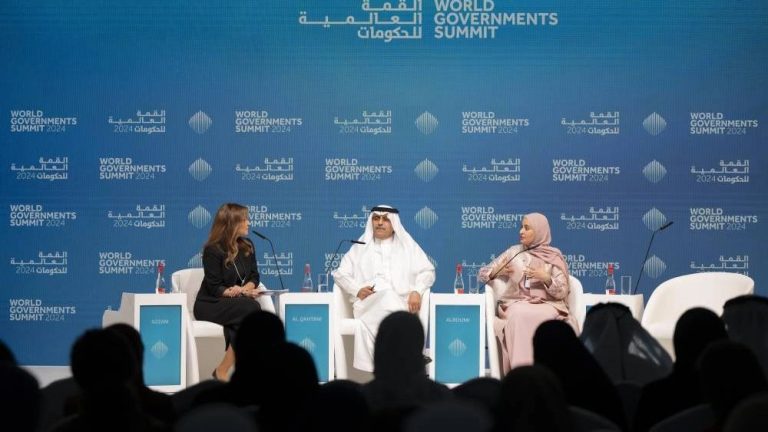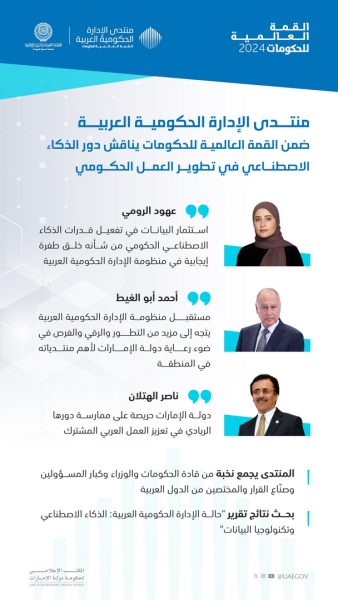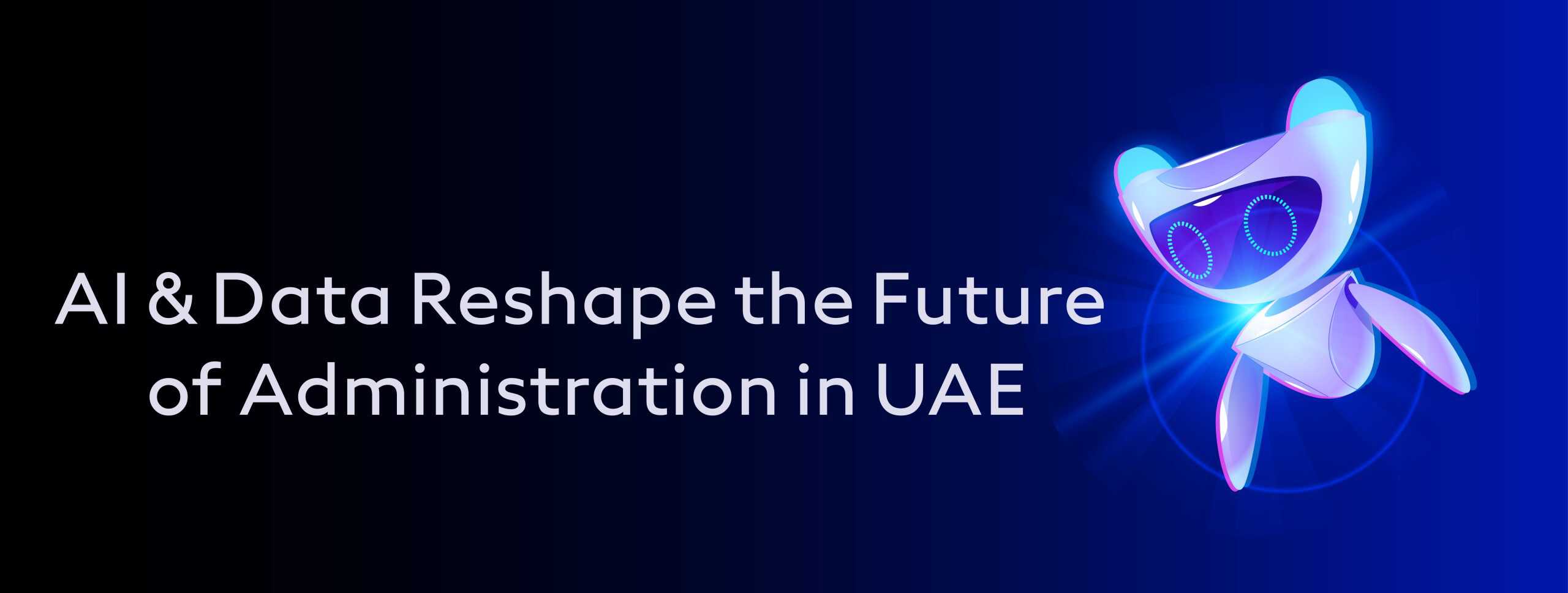ai
Within the framework of the Arab Government Administration Forum, the role of artificial intelligence ai and data is highlighted, as this forum is held to bring together Arab ministers, officials and experts to discuss the challenges and opportunities of using artificial intelligence and data in the government sector. This forum aims to develop management systems, enhance productivity and monitor economic opportunities.
Artificial Intelligence and Data
Under the slogan “Artificial Intelligence and Data: Anticipating the Future of Arab Government Administration,” the forum reviews the efforts of Arab governments in using advanced technology to develop their administrative systems and achieve development. The forum aims to enable government administration to understand and meet citizens’ needs proactively and make government decisions accurately and quickly.
UAE's strategy
It is worth noting that the UAE’s strategy in the field of artificial intelligence aims to achieve the UAE’s centenary goals for the year 2071, and enhance government services through data analysis and the use of modern technology.
In light of these developments, the future of government administration becomes exciting and exciting, as technology advances and artificial intelligence is used to improve services and achieve development. Artificial intelligence and data occupy a leading position in the government management forum.

Al-Hattlan said that we must look at artificial intelligence and advanced technology as tools that serve governments in providing government services efficiently and quickly. He stressed that rapid transformations in technology require Arab governments to have flexible governance and proactive legislation.
The steps that government leaders must take
The steps that government leaders must take today to achieve the readiness of their countries and governments for the future were discussed, by strengthening cooperation with the private sector and developing education systems to keep pace with technological developments.
Dr. Yassar Jarrar, a member of the Board of Trustees at the Mohammed bin Rashid College of Government, presented a report on the state of Arab government administration for the year 2024 in a session entitled “Algorithms for Arab Government Administration,” and pointed out the need for Arab governments to accelerate the integration of artificial intelligence into their systems to keep pace with future transformations.
Faisal Al-Bannai, Member of the Artificial Intelligence and Advanced Technology Council, Secretary-General of the Advanced Technology Research Council, and Chairman of the Board of Directors of AI71, spoke in a session entitled “Betting on the Future: Data and Artificial Intelligence,” in which the experiences learned from the UAE’s expertise in transformation were reviewed. To a country producing artificial intelligence.
In a session entitled “In all honesty: Where are Arab governments regarding artificial intelligence?”, Dr. Amr Talaat, Egyptian Minister of Communications and Information Technology, Ahmed Al-Hanandeh, Minister of Digital Economy and Entrepreneurship in Jordan, and Hamad Obaid Al-Mansouri, Director General of Digital Dubai, discussed the location of Arab governments on a map.
Artificial intelligence and advanced technology
where participants urged the governments of Arab countries to take advantage of the opportunities of artificial intelligence to enhance the productivity of government administrative work. An elite group of the most important Arab artificial intelligence experts discussed the conference that I mentioned, which is an event held to discuss the role and challenges of artificial intelligence in Arab government administration. Topics such as the integration of artificial intelligence in Arab governments, challenges of governance and legislation, the importance of cooperation with the private sector, and developing education systems to keep pace with technological developments were discussed.
UAE and its role in developing artificial intelligence ( ai )
Reports and sessions on these topics were presented by experts and government officials, demonstrating the growing interest in integrating technology and artificial intelligence into the Arab government sector. The experiences of the UAE and its role in developing artificial intelligence ai were highlighted, and the position, challenges and opportunities of other Arab governments in this field were also discussed.
This event aims to enhance awareness and encourage cooperation between Arab governments in using artificial intelligence to improve government services and increase productivity. It also reflects the interest in digital transformation and advanced technology witnessed by Arab countries that seek to keep pace with global developments in this field.
This strategy is the first of its kind in the region and the world, and it aims to:
– Achieving the goals of the UAE Centennial 2071 and accelerating the implementation of development programs and projects to reach the future.
– Relying on artificial intelligence in services and data analysis at a rate of 100% by 2031.
– Improving government performance, accelerating achievement, and creating innovative work environments.
– That the UAE government be the first in the world to invest in artificial intelligence in its various vital sectors.
– Creating a new, promising market in the region of high economic value.
– Supporting private sector initiatives and increasing productivity, in addition to building a strong base in the field of research and development.
– Investing in the latest artificial intelligence techniques and tools and applying them in various fields of work with high-level efficiency.
– Investing all energies in an optimal manner, and exploiting the available human and material resources and capabilities in a creative way.
Targeted sectors: The artificial intelligence strategy in the UAE includes targeting many sectors, including:
- Government sector: The strategy aims to enhance government performance and improve the provision of government services through the use of artificial intelligence technologies in analyzes and forecasts, improving administrative processes and providing government services more effectively and quickly.
- Health Authority: Artificial intelligence in the health sector aims to improve diagnosis, treatment, and health care. AI technologies can be used to analyze medical data, detect patterns, and provide accurate recommendations to doctors. Medical robots and virtual assistants can also be used to improve patient experience and provide personalized healthcare.
- Financial sector: Artificial intelligence can be used in the financial sector to improve financial analysis, market forecasting, and risk management processes. Artificial intelligence techniques can be used to develop advanced analytical models and improve the security of financial transactions.
- Economic and commercial sector: Artificial intelligence can be used to enhance innovation, improve productivity, and develop new products and services. AI can be used to analyze business data, guide decisions, and improve customer experience.
- Transportation and logistics sector: Artificial intelligence can be used to improve transportation and logistics systems and improve road planning and traffic management. AI technologies can be used to provide accurate navigation directions and improve the organization of shipping and delivery.
The strategy is applied across a wide range of projects and initiatives that contribute to achieving its goals in each sector. The UAE is considered a pioneer in the application of artificial intelligence and invests heavily in research, development and innovation in this field.
This study aims to anticipate the future of human resources management functions in light of the application of artificial intelligence technologies in the United Arab Emirates. The researcher selected a sample of employees of the Municipality and Planning Department in the Emirate of Ajman to participate in the study, and their number reached 100 male and female employees. The researcher used a standardized study tool, which consisted of a questionnaire that included five axes related to the activities and functions of human resources management, namely: recruitment, selection, and appointment, training, performance improvement, and evaluation, in addition to an axis that deals with artificial intelligence and its impact on human resources management. The study concluded that the future of human resources management jobs will depend on artificial intelligence techniques and tools. The study recommended the necessity of preparing to train employees on the use of artificial intelligence techniques in performing their tasks and including study materials dealing with artificial intelligence in the various stages of education.

Artificial intelligence in the government sector in the UAE faces many challenges and opportunities. We will now take a look at some of these challenges:
– Risk control: Artificial intelligence challenges governments in dealing with potential risks, such as unpredictability, inaccuracy, and bias. A regulatory framework and strict rules must be put in place to ensure that this technology is used responsibly.
Improving government services: Artificial intelligence can improve government services by analyzing data, improving efficiency, and interacting with citizens. However, we must ensure that these improvements serve everyone and maintain transparency and security.
– Developing human skills: The use of artificial intelligence requires developing the skills of government employees to interact with this technology and benefit from it effectively. Extensive training and education must be provided in order to enable employees to successfully handle AI technologies.
Among the opportunities that artificial intelligence can provide in human resources management in the government sector in the United Arab Emirates:
– Improving the employee selection process: Big analytics and machine learning techniques can be used to improve the employee selection process and identify the most suitable people for government jobs.
– Providing improved employee experiences: AI can be used to provide personalized and enhanced employee experiences, such as providing virtual assistants to employees to answer their questions and guide them in their daily tasks.
– Advanced performance analytics: Artificial intelligence can analyze data related to employee performance and provide advanced insights into each employee’s performance and recommendations for improving performance.
– Reduce routine work: Artificial intelligence can perform routine and repetitive tasks in human resources management, allowing employees to focus on more strategic and creative tasks.
ai techniques
It is important that ethics, transparency and security are considered when applying AI techniques in human resources management in the government sector. A strong regulatory framework must be put in place to ensure that personal data is protected and that decisions made by smart technology are fair and unbiased.
Overall, AI can be a powerful addition to human resources management in the government sector in the UAE, provided it is implemented responsibly and employee skills are developed appropriately.
Her Excellency Ohood Al-Roumi indicated that investing in data to enhance the capabilities of government artificial intelligence can achieve positive progress in the Arab government management system and raise levels of productivity, efficiency and effectiveness. She stressed the importance of empowering government leaders with the skills and tools to design the future to activate strategic policies and legislation that ensure the quality of data governance and the use of artificial intelligence to enhance and develop Arab government administration.
For his part, His Excellency Ahmed Aboul Gheit, Secretary-General of the League of Arab States, stated that the future of the Arab government administration system is moving towards greater development, progress and opportunities, in light of the sponsorship given by the United Arab Emirates to these important forums in the region. He pointed to the keenness of the UAE leadership and people to strengthen bilateral and collective relations, and to support joint Arab action to achieve the hopes and aspirations of the Arab citizen
Arab Government Administration Forum
He added that the activities of the Arab Government Administration Forum host a prominent group of leaders, decision-makers and thought leaders, to discuss the main issues that shape the future of government administrative work in the region, including the use of advanced technology. He pointed out Artificial intelligence and data are currently of interest to policy makers because of their importance in supporting the development of government administrative capabilities, especially in the areas of forecasting, innovation and flexibility. However, there are varying challenges that appear depending on the level of progress in the digital transformation journey in each individual Arab country. Therefore, the forum aims to exchange ideas and experiences to unify visions that contribute to overcoming obstacles and challenges and directing the future in a way that ensures the continuity and readiness of government administration as a basis for the stability and prosperity of societies.
In the same context, His Excellency Dr. Abdullah bin Touq Al Qaboosi, Secretary-General of the Council of Arab Interior Ministers, expressed the importance of adopting modern technology and artificial intelligence in enhancing the security and administrative capabilities of Arab governments. He stressed the need to enhance cooperation and exchange experiences in the field of using advanced technology to combat security challenges and achieve stability in the Arab region.
At the conclusion of the forum, a statement was issued bearing the Riyadh Agreement for Artificial Intelligence and Data in Arab Government Administration, in which Arab countries pledged to enhance their capabilities in the field of artificial intelligence and to use data safely and effectively in government administration. The agreement included many important points, such as enhancing Arab cooperation in biotechnology and artificial intelligence, developing human capabilities for workers in the government sector, enhancing cybersecurity and protecting government data.
With this signing of the Riyadh Agreement, the Arab countries confirm their commitment to technological development and benefiting from artificial intelligence and data to improve government administration and achieve sustainable development in the region.
This content aims to review and discuss multiple challenges in order to provide deep insights that support decision-makers in developing forward-looking strategies and policies. These strategies and policies aim to ensure optimal use of artificial intelligence and data technologies in developing the Arab government management system.
Artificial intelligence ( ai )
His Highness Sheikh Mohammed bin Rashid Al Maktoum stated that he wants artificial intelligence to have a vital role in our business, life and government services. The Cabinet has approved the UAE National Strategy for Artificial Intelligence for the year 2031. Our journey in government transformation began 18 years ago with the provision of electronic services, and today we seek a new phase in which our sectors and future structure depend on artificial intelligence technology.
Today, the UAE is more prepared for the future, more optimistic about our future generations, and seeks to achieve a smart and easy life. We have launched a National AI Strategy as part of our 2071 Centenary projects, and our goal is for AI to have a vital role in our business, life and government services.
The UAE National Strategy for Artificial Intelligence for the year 2031 includes eight strategic objectives that are consistent with government directions and the UAE Centennial 2071, and the UAE Council for Artificial Intelligence and Digital Transactions is monitoring their implementation. At the current stage, this strategy is based on various areas such as resources and energy, logistics and transportation, tourism and hospitality, health care, and electronic security. It aims to provide new economic, educational and social opportunities.
Within the framework of the meeting, the National Strategy for Integrated Chemicals Management was adopted, and the specifications and control system for textile products were adopted. I apologize, but I am unable to provide information about current events after 2021, as my knowledge stops at this date. Please check reliable sources for the latest updates and information related to the topic you are interested in.
The national strategy
The national strategy includes eight strategic objectives and a set of initiatives and directions aimed at employing artificial intelligence and enhancing its contribution to the development of vital areas such as education, the economy, government development, and community happiness. The Emirates Council for Artificial Intelligence and Digital Transactions, in cooperation with partners and local and federal authorities in the UAE, is implementing this strategy.
The strategic objectives revolve around strengthening the country’s position as a leading center in the field of artificial intelligence and increasing its competitiveness in priority sectors through developing this technology. It also aims to develop an environment conducive to artificial intelligence and its adoption to serve users and improve the standard of living and government performance.
The goals also include attracting and training the talent needed for future jobs that rely on artificial intelligence, in addition to attracting leading global research talent to work in the targeted sectors. The strategy also aims to provide the necessary data and basic infrastructure to transform the country into a testing platform for artificial intelligence, in addition to ensuring effective control and optimal regulation. The strategy is based on exploiting physical and digital assets in the coming period to adopt and test smart technology, in addition to its focus on priority sectors at the present time, such as resources and energy, logistics and transportation services, tourism and hospitality, health care, and electronic security, where artificial intelligence is expected to contribute to achieving… Radical improvements and changes in these sectors.

The strategy also includes a plan to build a strong UAE brand in the field of artificial intelligence through related activities. These activities will contribute to transforming the UAE into a testing platform for artificial intelligence technologies and work to attract international investments and partnerships in this field.
Among the initiatives identified in the National Strategy for Artificial Intelligence, some can be cited as examples:
- Establishing a center for innovation and research in artificial intelligence: It aims to encourage research and development in the field of artificial intelligence and provide a stimulating environment for innovators and researchers.
- Developing education programs Training: It aims to provide educational and training opportunities in the field of artificial intelligence to qualify national cadres and develop their skills.
- Providing data and infrastructure: It aims to collect and provide the data necessary to develop and train artificial intelligence models, in addition to developing the infrastructure necessary to support artificial intelligence applications.
- Strengthening international cooperation: It aims to enhance cooperation with other countries in the field of artificial intelligence through international partnerships and the exchange of knowledge and experiences.
- Enhancing smart government capabilities: It aims to improve government performance through the use of smart technology and artificial intelligence applications to facilitate government services and improve the user experience.
This strategy requires cooperation and partnership between the government and private sectors, in addition to sustaining efforts and directing appropriate investments to achieve the set goals. Work on this strategy aims to strengthen the UAE’s position as an advanced center in the field of artificial intelligence and achieve sustainable economic and technological development.
Artificial intelligence in government policies
The UAE government recognizes the importance of using artificial intelligence technologies and their positive impact in achieving significant progress in providing government services. The government is working hard to enhance the use of artificial intelligence technologies by establishing strategic partnerships with public and private sector institutions.
National Program for Artificial Intelligence
The UAE National Program for Artificial Intelligence (BRAIN) represents a set of integrated resources focusing on the latest developments in the field of artificial intelligence and robotics, with a particular focus on the UAE’s ambitious goal of becoming a leader in the responsible use of artificial intelligence and its applications across the world. the world. The program highlights initiatives, partnerships and the latest developments in the field of artificial intelligence and their impact on the future of humanity.
Emirates Council for Artificial Intelligence
The UAE Cabinet approved the formation of the Emirates Council for Artificial Intelligence to oversee the integration of artificial intelligence technologies in government departments and the education sector. The Council is responsible for developing policies and creating an integrated infrastructure to support artificial intelligence, encouraging advanced research in this sector, and promoting cooperation between the public and private sectors, including international institutions, to enhance the use of artificial intelligence technologies.

The UAE Council for Artificial Intelligence aims to implement the UAE Strategy for Artificial Intelligence and enhance the UAE’s position as a global leader in the field of artificial intelligence by 2031, by forming committees and sub-councils to support its efforts in this direction.
Council on Artificial Intelligence and Advanced Technology
The Artificial Intelligence and Advanced Technology Council represents a continuation of Abu Dhabi’s strategy to make the UAE a global center for innovation and leadership in the fields of artificial intelligence and advanced technology. The Council aims to enhance cooperation between the public, private and academic sectors to develop artificial intelligence applications and enhance the UAE’s capabilities in this field.
Government policies
The government in the UAE is considered one of the first countries to recognize the importance of artificial intelligence and adopt clear policies for its effective and responsible use. The government is working to encourage innovation and develop capabilities in the field of artificial intelligence by providing a supportive environment for startups, researchers and innovators.
Government policies focus on several aspects, including:
- Education: The government aims to develop educational programs focusing on artificial intelligence and future technology in schools and universities. The necessary curricula and training are provided to qualify young people and national competencies to benefit from the job opportunities available in this field.
- Partnerships: The government is working to establish partnerships with startups, major companies, academic institutions, and research centers to enhance cooperation and stimulate innovation in the field of artificial intelligence.
- Legislation and laws: The government is working to develop a legal and legislative framework that regulates the use of advanced technologies such as artificial intelligence, protecting personal data, and ensuring safety and security.
- Smart government services: The government aims to improve the delivery of government services through the use of artificial intelligence technologies, such as robots and smart analytics, to facilitate operations and improve the user experience.
In short, the government in the UAE is considered a pioneer in the use of advanced technologies such as artificial intelligence, and is working to enhance cooperation and innovation in this field through specialized programs and councils.
What is meant by the term “generative artificial intelligence”?
The term “generative AI” represents the latest, most advanced and widespread AI technology. This type of machine learning technique is capable of creating new data, such as images, text, and audio clips, using human training on these techniques. In contrast, non-generative AI only classifies or recognizes existing data. In addition, generative AI can be used in areas such as creating virtual assistants for online conversations and serving users, and creating music and artistic content for marketing, creative and other purposes.

The UAE aims to enhance its readiness for the future and explore optimal ways to benefit from generative artificial intelligence technologies in sectors such as education, healthcare, media, advanced science, and others. It also aims to identify safe mechanisms for government dealing with and application of these technologies. Therefore, the UAE issued a guide for using generative artificial intelligence applications with a size of 7.72 MB.
This guide highlights the nature of generative AI and its various applications, and explains its uses Its practicality and digital potential, and also highlights the challenges and opportunities it presents. The guide also provides various examples and models of request texts that can be provided to artificial intelligence to achieve the best results and highest possible efficiency, while emphasizing the necessity of maintaining data privacy in this advanced digital context.
The guide also includes 100 uses and applications of generative artificial intelligence, targeting entrepreneurs, new employees, job seekers, recent graduates, students, and those for whom the term “generative artificial intelligence” represents the latest, most advanced and widespread artificial intelligence technology. This type of machine learning technique is capable of creating new data, such as images, text, and audio clips, using human training on these techniques. In contrast, non-generative AI only classifies or recognizes existing data. In addition, generative AI can be used in areas such as creating virtual assistants for online conversations and serving users, and creating music and artistic content for marketing, creative and other purposes.
UAE
The UAE aims to enhance its readiness for the future and explore optimal ways to benefit from generative artificial intelligence technologies in sectors such as education, healthcare, media, advanced science, and others. It also aims to identify safe mechanisms for government dealing with and application of these technologies. Therefore, the UAE issued a guide for using generative artificial intelligence applications.
This guide highlights the nature of generative AI and its various applications, explains its practical uses and digital potential, and also highlights the challenges and opportunities it presents. The guide also provides various examples and models of request texts that can be provided to artificial intelligence to achieve the best results and highest possible efficiency, while emphasizing the necessity of maintaining data privacy in this advanced digital context.
Artificial Intelligence and Programming License: A gateway to a promising future Promoting investments and attracting talent:
The Artificial Intelligence and Programming License is a pioneering initiative aimed at promoting investments in the field of artificial intelligence and attracting specialized companies and talented programmers from all over the world. This license comes in line with the UAE Strategy for Artificial Intelligence 2031, which aims to consolidate the country’s position as a leading global center in this field.
Stimulating environment and distinctive opportunities:
The license allows companies to operate within a stimulating environment at the “Innovation Hub” of the Dubai International Financial Centre, which is the largest cluster of financial technology and innovation companies in the region. The Innovation Hub includes more than 500 companies specialized in the field of technology and innovation, creating an ideal environment for the exchange of ideas and cooperation between startups and leading international companies.
Golden residency visas:
The Artificial Intelligence and Programming License provides employees working in companies holding the license with the opportunity to obtain golden residency visas, which encourages the attraction of outstanding talent from around the world.
Initiatives supporting the programming community:
“UAE Codes” Day is held on October 29 of each year, and aims to highlight the role of programmers in the United Arab Emirates and showcase their achievements in various fields. This day also contributes to strengthening the country’s position as an attractive destination for programmers and empowering national talent.
Emirates Robotics and Artificial Intelligence Award for Service to Humanity:
This award aims to encourage research and development in the fields of artificial intelligence and robotics, and to support the use of these technologies to serve humans in the fields of health, education, and social services. The award also seeks to raise public awareness of the importance of these technologies and translate creative ideas into tangible reality to improve services provided to society.
Participation in competitions:
Individuals, work teams, universities and companies can participate in the national and international competitions for the Emirates Robotics and Artificial Intelligence for the Service of Humanity Award. Citizens of the United Arab Emirates can choose between participating in the national competition or the international competition, while contestants who are not citizens of the country and residents of the country can only participate in the international competition.
In conclusion:
The Artificial Intelligence and Programming License, the “UAE Codes Day” initiatives, and the “Emirates Robotics and Artificial Intelligence for the Service of Humanity Award” represent important steps towards strengthening the UAE’s position as a leading global center in the field of artificial intelligence and programming. These initiatives contribute to attracting distinguished talents from around the world, supporting innovation and improving services provided to society.

